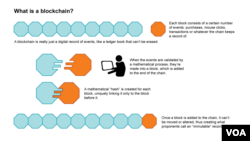What if you could wave your phone over a piece of fish at a store and immediately see a record of its path through the supply chain?
This may soon be possible. Current experiments are testing technology that can show how the fish was caught, when it was shipped and how it was processed at a factory.
This technology, called Blockchain, is being tested for its potential to bring light to secretive industries in Southeast Asia.
Same technology, new uses
Blockchain was first developed to confirm dealings in bitcoin, a digital money. In that case, the technology creates a public financial record.
In Southeast Asia important records, including those of identity information and property ownership, are often not carefully kept.
Erin Murphy is the founder and leader of Inle Advisory Group, a business advisory company working in Myanmar and other countries with developing markets. She said Blockchain technology helps make business operations in such countries safer and easier.
"Ideally, we would want to see adoption of Blockchain at an official level all across the region. But perhaps not surprisingly, the governments that are leading Blockchain adoption are those that are already low-corruption," she told VOA.
In some countries like Singapore, Murphy said Blockchain is being used to improve customer service processes. However in other countries, like the Philippines, Blockchain helps citizens safely send money home from foreign countries.
Murphy said the technology will help development, lower poverty, and increase foreign investment.
Observing the flow
Right now, there are many programs in Southeast Asia experimenting with Blockchain technology.
In June, the United Nations presented a Blockchain-based system built in partnership with the technology company Microsoft and professional services company Accenture. The system gives stateless refugees a permanent identity record based on biometric data.
The technology is also being explored in connection with efforts to improve voting system security.
A Blockchain based app developed to observe the supply chain of fish from Indonesia is now being used with other industries, including clothing.
Results from a pilot project can be found on the internet. Viewers can observe the movement of a piece of clothing from an alpaca farm in Dulverton, Britain, through every step of production to its final stop at a shop in London.
Alisa DiCaprio is the head of research at R3, a banking software company that uses technology similar to Blockchain. She said getting the technology and being able to use it are separate issues.
Most countries have engineers who can rightly code the technology, she said. However, they do not always understand how to make it work for businesses and industries.
DiCaprio predicts it will take about five years before we actually see Blockchain used widely. She said she believes the most important effects of the technology will be seen on a macro-economic level.
Division in the community
However, the Blockchain community is divided on how the technology should be used.
Some see Blockchain as a tool that can interfere with a global financial system they believe is corrupt.
"There is a serious opportunity for us here to remove money out of government," said a Southeast Asia based bitcoin trader.
He said billions of people who are unable to use an official banking system will be able to move money with just a phone.
Another group wants to see Blockchain technology used by states, such as Canada, Singapore, China and Germany. All of these countries are exploring or experimenting with digital money using Blockchain.
Michael Hsieh is with the Center for International Security and Cooperation at Stanford University. He suggested that Blockchain creates a threat for governments only if they ignore the technology. Countries that use it to establish safe and honest systems for money exchange will appeal to business and investment interests, he said.
I’m Phil Dierking.
This story was originally written for VOANews by David Boyle. Phil Dierking adapted the story for VOA Learning English. Caty Weaver was the editor.
Do you think digital money services like bitcoin and Blockchain are safe? Write to us in the Comments Section or on our Facebook page.
______________________________________________________________
Words in This Story
code - v. to change information into a set of letters, numbers, or symbols that can be read by a computer.
customer - n. someone who buys goods or services from a business.
potential - n. a chance or possibility that something will happen or exist in the future.
biometric data - n. computer information including samples, models, fingerprints, similarity scores and all verification of a person excluding the individual's name and demographics.
macro - adj. large
supply chain - n. the sequence of processes involved in the production and distribution of a commodity.
transaction - n. an occurrence in which goods, services, or money are passed from one person, account, etc., to another.






